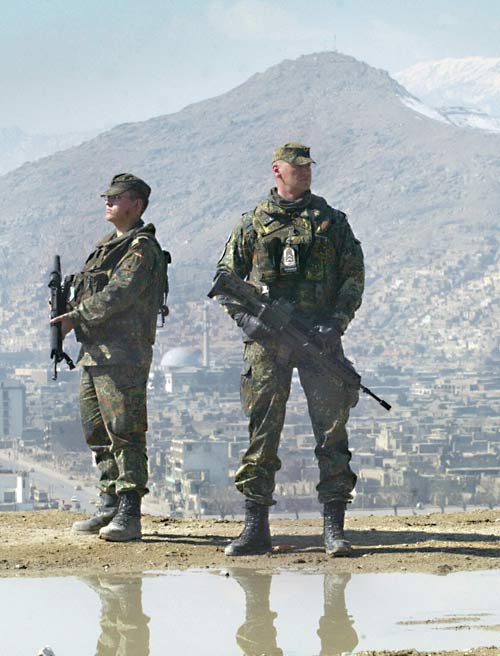Germany rejects US demand to increase Afghan deployment

Your support helps us to tell the story
From reproductive rights to climate change to Big Tech, The Independent is on the ground when the story is developing. Whether it's investigating the financials of Elon Musk's pro-Trump PAC or producing our latest documentary, 'The A Word', which shines a light on the American women fighting for reproductive rights, we know how important it is to parse out the facts from the messaging.
At such a critical moment in US history, we need reporters on the ground. Your donation allows us to keep sending journalists to speak to both sides of the story.
The Independent is trusted by Americans across the entire political spectrum. And unlike many other quality news outlets, we choose not to lock Americans out of our reporting and analysis with paywalls. We believe quality journalism should be available to everyone, paid for by those who can afford it.
Your support makes all the difference.A bitter diplomatic row between Germany and the United States deepened yesterday after Berlin flatly rejected demands from Washington that it deploy troops in war-torn southern Afghanistan and angrily dismissed the request as "impertinent" and a "fantastic cheek".
Germany currently has some 3,200 soldiers stationed in comparatively tranquil northern Afghanistan and the capital Kabul as part of the current Nato peacekeeping mission. It has been urged to deploy troops in the south before but has consistently refused. Yesterday however, it became clear that Washington had stepped up pressure on Berlin to commit troops to the south.
The move followed increased Taliban attacks and threats from Canada that it would withdraw its Afghanistan contingent completely unless more Nato troops were sent south. Canada has lost 77 combat troops in the region.
Two US non-governmental studies released this week warned that Afghanistan could once again become a failed state and terrorist haven.
Details of what was described as an "unusually stern" letter written by Robert Gates, the US Defence Secretary, to Franz Josef Jung, his German counterpart, were leaked to the Süddeutsche Zeitung newspaper yesterday.
The letter described Germany's performance as "disappointing" and asked it to consider a new Afghanistan mandate which would enable its paratroopers and helicopter units to be sent to the south of the country. It said the US wanted German soldiers to help replace an American contingent of 2,200 troops which is to be withdrawn this autumn.
Germany's response was a mixture of outrage and surprise. Initial comments leaked from an unnamed defence ministry source described the Gates' letter as "impertinent", and as a "fantastic cheek". One official accused Mr Gates of trying to inflict "psychological torture" on Germany.
Chancellor Angela Merkel let it be known through her spokesman that the issue was "not up for discussion". Franz-Walter Steinmeier, the German Foreign minister, also flatly rejected the idea. "I think we must continue to focus our attention on the north," he said.
Mr Jung later justified the German position insisting that there were "clear regional divisions" regarding troop deployment in Afghanistan. "Our current mandate only allows for German soldiers to be sent to the south in emergencies," he said. The issue is expected to come to a head next week when Nato defence ministers meet in Lithuania to discuss Afghanistan. Social Democrat MPs in Ms Merkel's conservative-led grand coalition government also argued strongly against the idea of sending troops south. Rainer Arnold, the party's defence spokesman, warned that the idea risked undermining the already shaky public support for Germany's entire Afghanistan mission.
"I cannot see broad acceptance for this idea coming from parliament or from the public", he said "This is a precondition for our continued presence in Afghanistan." Germany's presence in the relatively peaceful north of Afghanistan is already unpopular. An opinion poll last year suggested that more than 50 per cent of Germans wanted a complete withdrawal of troops. Ms Merkel's government is currently facing opposition to plans to deploy a 200-strong unit of combat forces in the north to replace a Norwegian unit which is currently policing the region.
Germany has already been afforded a special Nato caveat which in effective prohibits its troops from going on the offensive unless they are first attacked. At next Thursday's Nato summit in Vilnius, Germany is expected to come under intense pressure to lift the caveat.
Several German commentators attacked the government for rejecting the American request. The left-leaning Süddeutsche Zeitung accused politicians of being afraid of the voters.
* The US Secretary of State, Condoleezza Rice, will visit London next week to discuss strategy on Afghanistan, Iran and other issues with the Foreign Secretary, David Miliband. Ms Rice, who arrives on Wednesday, will also meet the Prime Minister, Gordon Brown.
Subscribe to Independent Premium to bookmark this article
Want to bookmark your favourite articles and stories to read or reference later? Start your Independent Premium subscription today.
Join our commenting forum
Join thought-provoking conversations, follow other Independent readers and see their replies
Comments